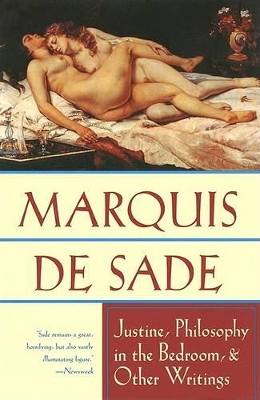Thank you, Ada Palmer. I had my suspicions about Sade, that more was going on than just some shock and awe erotica, and in Too Like The Lightning, when he becomes part of the dialogue in a key way, she makes it clear that to read Sade as sadism is too narrow a view. I had to go to the source to confirm it, and confirm it I have.
“I am about to put forward some major ideas; they will be heard and pondered. If not all of them please, surely a few will; in some sort, then, I shall have contributed to the progress of our age, and shall be content.” (from “Yet Another Effort, Frenchmen, If You Would Become Republicans”)
Sade wants you to think. It’s all to a point— one that kept him imprisoned for much of his life. He’s in dialogue with his peers. He’s parodying 18th century scientific logic. He’s invoking taboo because, as Palmer would put it, that’s the Enlightenment art: mixing forbidden sex acts with forbidden things, especially forbidden talk.
Context is everything. And Sade, within context, isn’t a beast who’s willing to file down his teeth. His pornography is ideas— scathing, provoking, often remarkably funny, terribly, boldly uncensored ideas. About God. Philosophy. Crime and punishment. Sexuality. Morality. On and on. There isn’t an extreme he won’t push. I get the feeling he gleefully contradicts himself, intentionally, again, just to get readers to think. Don’t take it all as read, even what he’s saying. Think you get his point? Wrong again, think some more.
He’s a piece of a larger puzzle, and I would argue a crucial one. All these centuries later, he has refused to die, and it’s worth listening to what he has to say, if only to see where we might still be blind.
Sade warns that he who would use Reason as a key to open one door opens many, and he who would make Reason a scythe to fell injustices must beware what else the blade might cut.
